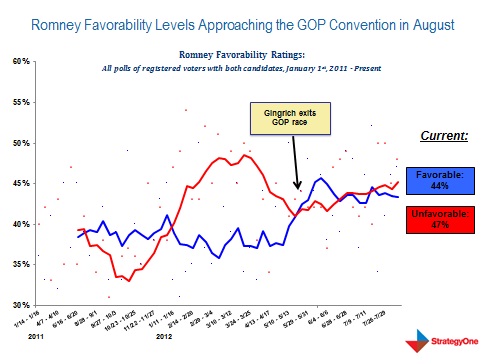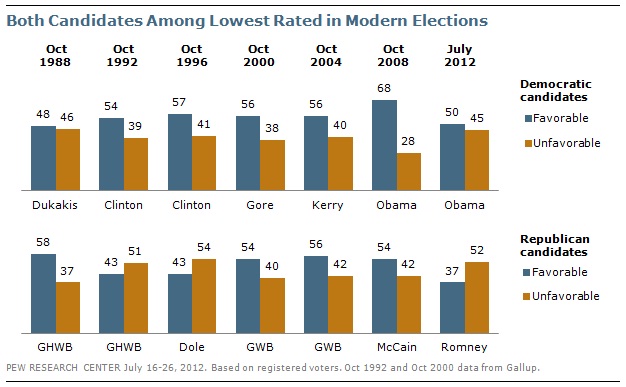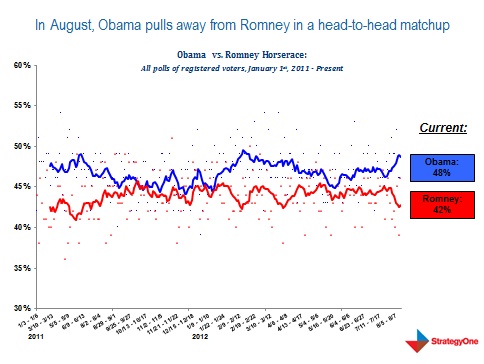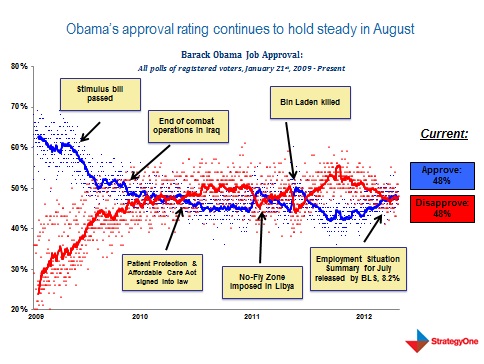
Buried in most of the dissection of the Republican nominee's VP choice is one simple fact: Mitt Romney is losing this race. The Obama team's advertising assault that began in April has had an impact; Romney's favorability is underwater and he has lost ground in the head-to-head over the last 30 days. While the polls have bounced around over the last few months, we've settled into a period where the president is clearly ahead. I think we can safely say that if the election were held today Obama would win.
While the advertising spend for team Romney achieved parity with Obama's over the last few weeks, they were being outspent considerably in the spring and early summer. This took a toll. The negative assault on Romney -- including attacks on his time at Bain, offshore accounts and his refusal to release his personal tax records -- have framed a picture for swing voters that isn't pretty. Romney's favorability rating has dropped a few points since May, but take a close look at the increase in his unfavorables during that time. Right now, his unfavorable rating (47 percent) is higher than his favorable rating (44 percent). This is a debilitating situation for the Governor and needs to be corrected immediately if he is to take advantage of voter concerns over the weak economy.

The Obama campaign team has done an effective job of defining Romney as someone disinterested in -- and disconnected with -- the problems of the middle class. This is deadly for a presidential candidate and is similar to what the Clinton team did to Bob Dole in 1996 (which resulted in a similar underwater favorability rating). In fact, as the analysis below from Pew Research shows (using July numbers for the current candidates which for Romney are worse than our current assessment), Romney's favorability rating is the worst of any recent major presidential candidate.

When you look at vote share the picture is even more problematic for the Romney campaign. The trend shows that the gap between the two candidates has widened over the last 30 days. Our current average of the last five national polls of registered voters has Obama at 48 percent and Romney at 42 percent.

Our assumption has always been that if Obama is below 50 percent vote share and Governor Romney is within two or three points after Labor Day then Romney has a better than 50/50 chance of winning, since most undecided voters will break toward the challenger. That model is out the door if the incumbent has a six-point lead and the challenger's unfavorables are near 50 percent. Obama's 47-48 percent share of the national popular vote is nearly identical to Bush's 48 percent mark against Kerry in a Washington Post poll taken in August 2004 (at the time, Bush was in a statistical tie with Kerry). While Clinton's 1996 vote share was lower due to the dynamic of Ross Perot's Reform Party challenge, he was also in a 44 percent to 42 percent tie with Bob Dole in an August 1996 Newsweek poll. To find a reelection that wasn't in a near-tie for most of the summer, you have to go back to Reagan's comfortable 14-point lead over Mondale in an August 1984 Time poll. With current voter attitudes so sharply divided and partisanship at an all-time high, only a small percentage of the electorate is truly swing voters and most national races will be close from wire-to-wire, regardless of the candidates. Therefore, a five- or six-point statistically significant lead is meaningful and surely has registered with the Romney team.
Finally, take a look at Obama's approval rating. We have always maintained that it is relatively weak. An approval rating in the high 40s allows for reelection but not with a great deal of wiggle room. Low to mid 40s signals a vulnerable incumbent. Obama is at 48 percent right now. But what's most important is the trend, and Obama's recent trajectory shows solid improvement over the last year.

If this election had been held in the fall of 2011, Obama would have lost. But in the late summer of 2012 he is in reasonably good shape. Obama's current 48 percent approval rating is similar to several other modern presidents who were elected to a second term. According to the USA Today's historic data, in mid-August before their reelections George W. Bush (47 percent), Ronald Reagan (53 percent) and Bill Clinton (52 percent) all posted similar marks. Obama is also well ahead of the two incumbents who went on to lose: Jimmy Carter (33 percent) and George H.W. Bush (32 percent).
Having said the above, this thing is FAR from over and Romney still has several factors in his favor. First, Obama is continues to poll below 50 percent. As we learned in 2004 this does not mean defeat for the incumbent but it does suggest that the President is vulnerable.
Second, the economy and the jobs situation remain weak and can be severely impacted by events in Europe. The unemployment rate ticked back up to 8.3 percent in July. Even though jobs were added, the rate still climbed slightly because 852,000 discouraged workers left the labor force that month, a decline of 267,000 from a year earlier. We have said it before but it bears repeating: this is all about perception. If there are major job gains (200k per month) over the next two months the perception will be that things are improving. If not, then voters will view this as a stagnant (or worse) economy and Romney will benefit.
Third, the President's own favorability rating has been hurt by his negative ads. Voters now see Obama as more of a candidate than a president. The campaign team clearly made the calculation that the president had personal likability that could be leveraged (and, as we stated above, this has been put to good use) but it has had a negative impact on personal perceptions of Obama.
Lastly, his VP choice gives Romney an opportunity to offer his own direction for the country and to differentiate himself from Obama. And while Democrats will go into overdrive to paint the Ryan selection as a negative, this is an opportunity for Team Romney to present a clear differentiation between his governing philosophy and Obama's. To do that, Team Romney will need to take on the entitlement issue. This video was released moments ago and is probably the first of many on the subject.
Let's talk about the Ryan selection. Generally, people are probably reading too much into the pick. The whole idea that "the Romney campaign realized that it couldn't just run a referendum campaign and so it needed to pick someone who could articulate the philosophical 'choice' between the two candidates" is, I think, a bit of a reach. The fact is that every campaign (when there is an incumbent) is BOTH a referendum and a choice. There are both positives and negatives associated with the Ryan pick and they have been much scrutinized over the last 72 hours.
- The idea that Democrats are eager to run against Ryan and that this was their dream pick is a little silly. Our sense is that this will energize the GOP base a bit, and it will also gin up some concerns among certain Democrats and seniors, making this basically a wash from a vote count standpoint.
- Ryan will help a bit in the sense that he's an articulate spokesman for Republican policies, often better than Romney. He'll be effective in his debate, and he's got an optimism about him that should wear well.
- On the flip side, this allows Democrats to tie Romney more closely to the Republican Congress and, in particular, Republicans in the House who, as a group, have extremely low job approval numbers.
- The selection also allows Democrats to go after the GOP on Medicare, which is helpful for two reasons: first, Romney is strong with seniors and this could turn into a bit of a vulnerability with that group; second, it could help Democrats transition the debate away from jobs/the economy, which is, of course, the key to this election. The truth is that every day that Romney/Ryan aren't talking about jobs/the economy is a win for Obama. Having said that, we would be surprised if Medicare is what we are talking about in three weeks.
- All of this is interesting, but ultimately the VP pick doesn't matter all that much, except in very rare circumstances. And at this point we don't see the Ryan selection as one of those instances. Prior to the announcement, most voters didn't know enough about Ryan to have an opinion of him; he's at just 44 percent favorable -- 39 percent unfavorable in his home state of Wisconsin. The risk is that Romney has painted a target on his ticket by aligning himself with a detailed plan that would dramatically reshape the federal government. Clearly, team Obama will poke holes in the Ryan plan for the next three months and accuse Romney of planning to dismantle Social Security and Medicare, among other things. It is too early to tell whether this attack will work, but we would be very surprised if this campaign ends up being about Medicare. If it is, we know what the outcome will be.
- There are no new horserace polls out yet, but we wouldn't suggest anyone hold their breath for some dramatic movement in the wake of this announcement. First of all, while he is a star within the Beltway, most voters are still unfamiliar with Ryan. And data like the new Washington Post poll that shows a leap in Ryan's favorability is mostly a function of an upswing in his name ID.
Thanks to Pete Ventimiglia, Allison Quigley and John Zirinsky for their thoughts and contributions to this election monitor. Follow us on Twitter: @Steve_Lombardo.
Please note that the author was an advisor to the Romney for President campaign in 2008, but is not affiliated with any campaign in 2012.